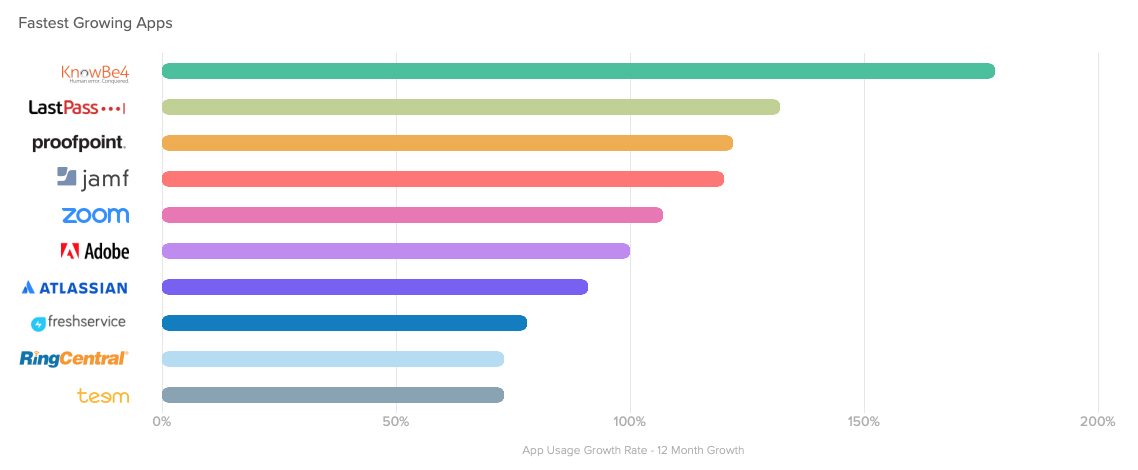How today’s workforce stays secure and what apps it prefers
User-focused security apps KnowBe4, LastPass, and Proofpoint dominate the list of fastest growing apps within enterprises, according to Okta.
“KnowBe4 in particular is fulfilling a clear market need: less than half of survey respondents have ever participated in cybersecurity training at work,” the company noted in its latest Businesses @ Work report, which is based on data collected between November 1, 2017 to October 31, 2018 from its Okta Integration Network.
Most popular apps
Microsoft Office 365 is (by far!) the most popular app, both by number of customers with the app deployed and by the number of active unique users.
In that first list it is followed by Salesforce, Amazon AWS, G Suite and Box, in the second by Workday, ServiceNow, Salesforce and G Suite.
“Since we first began ranking popular apps by number of customers, we’ve noticed a few honorees come and go. GoDaddy, LinkedIn, Twitter, and GoToMeeting, originally in the top 15, have left the party, while Office 365 has continued to hold the top spot,” the company noted.
“This year, video conferencing favorite Zoom appeared on the list for the first time, in 9th position. One of the most interesting findings of the year, Zoom is the only app this year to show up on both the most popular and fastest growing apps. And Slack took a step up in the rankings, measured by both number of customers and active users.”
The report also revealed companies’ increasing “appetite” for apps.
“The 115% growth rate of applications on average for our customers over the past 2 years confirmed that companies are relying upon more and more technology to accomplish their goals. The increase from 52 apps to 112 apps highlights the fact that organizations are offering more solutions and catering to the needs and demands of their workforce,” Ming Wu, VP of Data and Analytics at Okta, commented for Help Net Security.
Adoption of security tools increases
As mentioned before, security tools topped the list of fastest growing apps.
“KnowBe4, a security awareness training company, beat out other apps by far with its 178% year-over-year growth to claim the top spot. The adoption of LastPass, which stores encrypted passwords online, and Proofpoint, an email security and security awareness training provider, each grew over 100%,” the company discovered.
A separate survey for which Okta polled 1,200 US knowledge workers showed that 70% of companies are using two to four different authentication factors (SMS, Google Authenticator, Duo, YubiKey, etc.).
Multifactor authentication (MFA) is getting more sophisticated: there is a slow but steady shift away from lower assurance factors like SMS and security questions toward more secure factors such as app generated codes, push authentication, and physical keys.
“The speed at which customers adopted more secure factors and the factors that they added was something we will continue to spend time on,” Wu noted.
“Customers with less secure factors appeared to add more secure factors without necessarily ‘phasing out’ the less secure factors (SMS, Security Question). We were pleased to see the accelerated adoption of the more secure factors, but don’t yet have a clear answer for why the less secure factors did not drop more aggressively. Perhaps this was to minimize disruption to workers – after all, the knowledge worker survey highlighted that they want to have as few glitches as possible when using applications!”
Room for improvement
Still, when it comes to passwords, nearly 50% of survey respondents said they recycle the same 1-4 passwords for almost every account.
Only 15% of the respondents use password managers for storing their passwords, while 26% use a piece of paper or sticky note and 30% store their passwords in files on their desktop, phone or in the cloud.
“This bad behavior reveals a big opportunity for companies to automate the password process. A quarter of survey respondents want their companies to automate passwords and logins, which is second only to the desire for companies to automate software updates (29%),” the company concluded.
For more insight about popular apps in various non-security categories and results from the survey of knowledge workers check out the report.

